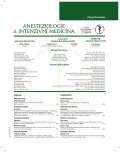Critical airway obstruction during general anaesthesia caused by anterior mediastinal mass managed by ECMO and tracheobronchial stenting
Authors:
K. Netri 1; J. Votruba 2; J. Rulíšek 1; L. Kraus 1; P. Michálek 1,3
Authors‘ workplace:
Klinika anesteziologie, resuscitace a intenzivní medicíny 1. LF UK a Všeobecné fakultní nemocnice, Praha
1; První klinika tuberkulózy a respiračních nemocí 1. LF UK a Všeobecné fakultní nemocnice, Praha
2; Department of Anaesthetics, Antrim Area Hospital, Antrim, Spojené království Velké Británie a Severního
Irska
3
Published in:
Anest. intenziv. Med., 27, 2016, č. 6, s. 390-394
Category:
Overview
Acute compression of the trachea and the large bronchi during anaesthesia can very quickly lead to development of life-threatening hypoxia, if alternative methods of oxygenation are not established immediately. The case report describes the course and management of a sudden collapse of the lower part of the trachea and main bronchi in a young patient who was indicated for the extirpation of deep cervical lymph nodes under general anesthesia. He developed very high inspiratory pressures with a significant reduction in lung volumes and desaturation, which was caused by compression of the airway due to a lymphoma mass in the anterior mediastinum. In order to improve oxygenation, a suction catheter was inserted endobronchially and the patient was ventilated through it. He was then connected to the ECMO device and definitive solution of the stenosis was achieved with a “Y” stent inserted into the trachea. Three years after the procedure, the underlying disease is in remission and the patient is in good health.
Keywords:
anterior mediastinal mass – tracheal obstruction – extracorporeal membrane oxygenation (ECMO) – stenting
Sources
1. Blank, R. S., de Souza, D. G. Anesthetic management of patients with an anterior mediastinal mass: continuing professional developement. Can. J. Anesth., 2011, 58, p. 853–867.
2. Goh, M. H., Liu, X. Y., Goh, Y. S. Anterior mediastinal masses: an anaesthetic challenge. Anaesthesia, 1999, 54, p. 670–682.
3. Hack, H. A., Wright, N. B., Wynn, R. F. The anaesthetic management of children with anterior mediastinal masses. Anaesthesia, 2008, 63, p. 837–846.
4. Acker, S. N., Linton, J., Tan, G. M., Garrington, T. P., Bruny, J., Hilden, J. M., Hoffman, L. M., Partrick, D. A. A multidisciplinary approach to the management of anterior mediastinal masses in children. J. Pediatr. Surg., 2015, 50, p. 875–878.
5. Stricker, P. A., Gurnaney, H. G. Anesthetic management ofchildren with an anterior mediastinal mass. J. Clin. Anesth., 2010, 22, p. 159–163.
6. Blessing, M., Schwartz, D., Krellenstein, D., Cohen, E. Management of a patient with an unexpected obstructing carinal mass. Minerva Anestesiol., 2010, 76, p. 761–764.
7. Said, S. M., Telesz, B. J., Makdisi, G., Quevedo, F. J., Suri, R. M., Allen, M. S., Mauermann, W. J. Awake cardipulmonary bypass to prevent hemodynamic collapse and loss of airway in a severely symptomatic patient with a mediastinal mass. Soc. Thorac. Surg., 2014, 98, p. 87–90.
8. Rajagopalan, S., Harbott, M., Ortiz, J., Bandi, V. Anesthetic management of a large mediastinal mass for tracheal stent placement. Rev. Brasil. Anestesiol., 2016, 66, p. 215–218.
9. Erdös, G., Tzanova, I. Perioperative anaesthetic management of mediastinal mass in adults. Eur. J. Anaesthesiol., 2009, 26, p. 627–632.
10. Slinger, P., Karsli, C. Management of the patient with a large anterior mediastinal mass: recurring myths. Curr. Opin. Anaesthesiol., 2007, 20, p. 1–3.
11. Michalek, P., Donaldson, W., Vobrubova, E., Hakl, M. Complications associated with the use of supraglottic airway devices in perioperative medicine. Biomed Res. Int., 2015.
Labels
Anaesthesiology, Resuscitation and Inten Intensive Care MedicineArticle was published in
Anaesthesiology and Intensive Care Medicine

2016 Issue 6
-
All articles in this issue
- Depth of anaesthesia monitoring
- Management of sepsis-induced disseminated intravascular coagulopathy using antithrombin and heparin, and the use of thromboelastometry in establishing the diagnosis of heparin resistance
- Ultrasound-guided blockade of the second and third trigeminal branches in geriatric patients
- Regional anaesthesia and haemostasis-modifying drugs – latest recommendations
- Preventive immobilisation of the cervical spine in pre-hospital emergency care in trauma patients: update
- Thrombophilic conditions during pregnancy
- Critical airway obstruction during general anaesthesia caused by anterior mediastinal mass managed by ECMO and tracheobronchial stenting
- Statistics in biomedical research I
- Guidelines for the Management of Severe Traumatic Brain Injury, Fourth Edition
- Anaesthesiology and Intensive Care Medicine
- Journal archive
- Current issue
- About the journal
Most read in this issue
- Depth of anaesthesia monitoring
- Thrombophilic conditions during pregnancy
- Regional anaesthesia and haemostasis-modifying drugs – latest recommendations
- Preventive immobilisation of the cervical spine in pre-hospital emergency care in trauma patients: update
